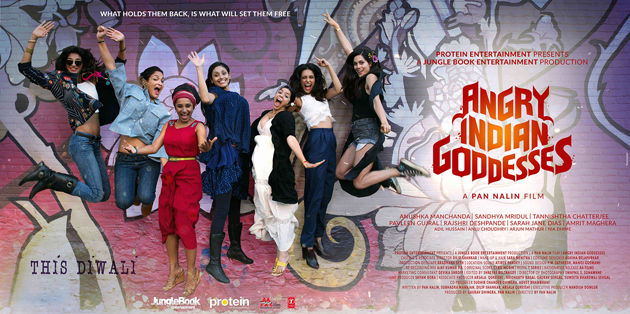Starring Sara Jane Dias, Tannishtha Chatterjee, Sandhya Mridul, Anushka Manchanda, Pavleen Gujral, Amrit Maghera, Rajshri Deshpande
Written & Directed by Pan Nalin
For all the perverts out there who think it’s their birthright to peer up women’s skirts, here’s a film that peers right into women’s souls…seven of them, all so grandly scripted they seem to have walked into the film from our lives.
Every one of the seven female protagonists played, let me tell you, by actresses who were born to be their characters, is so sharply written, I came away thinking of them as people whose lives I’d like to know more about. (Ah, us prying Indians, whether it’s skirts or lives, we just love to intrude.) Sadly by the time Pan Nalin’s exceedingly persuasive film ended, one of the ladies was no longer with us. Such is life.
The temptation to share details from the dexterous script is immense. This is the kind of cinema where scenes, situations, dialogues and moments would be discussed for years to come. But let’s not jump the gun. Shall we meet the protagonists, then? There is Frieda…no, not Pinto…God forbid! Sara-Jane Dias, who plays Frieda, is a far better actress than Ms Pinto. And speaks much better Hindi than Lisa Haydon.
I bring up Ms Dias’ qualities because her intrinsic gorgeousness is paramount the plot, as paramount as the Goan setting where these noisy unstoppable merry-making women thresh out their inner conflicts without letting the film’s resplendent surface suffer the sins of excessive conflict.
Indeed, this film magically converts cerebration into a celebration of womanhood. When the ladies sit down to talk about the discrimination and abuse they face every day the atmosphere is not submerged in and burdened by polemics. The tone even when driven by somberness is constantly light bright and endearing.
These are women who talk a relatable language, never mind the unwarranted censorial interference. They still make their point. You can’t put this irrepressible bunch of girls down. Each one of Pan Nalin’s heroines is memorable and beautiful in her own way. This big sexy rumbustious girl-bonding film does complete justice to each character. I can just see how happy every actress must have been to own the roles offered to them.
Some of these actresses are relatively unknown to the screen and yet irreplaceably in character. I’ve to mention Pavleen Gujral’s ‘Pam’, a suspiciously giggly and loud Delhi housewife desperately unhappy underneath (akin to Nandita Das in Deepa Mehta’s Fire, but not gay). Her meltdown sequence with Anushka Manchanda (playing, what else, a singer with natural ease) is worthy of being flashed during awards nomination.
Sandhya Mridul furnishes her clichéd part of the workaholic mother with a kind of edgy passion. It’s the need of the hour. The film is motivated by a surge of contagious energy that leaves the characters and the audience breathless with anxiety.
Rajshri Deshpande as the ebullient maid is a joy to behold, especially when she does an item number with Jo the Bollywood aspirant (played with tenderness and compassion by Amrit Maghera). But Rajshri is a tad too glamorous for the maid’s part. Or maybe I am stereotyping the woman in a film that does exactly the opposite?
And Tannishtha Chatterjee…she makes a late entry. What can I say about her without giving away the plot? Better late…She always blends into every role she plays.
Angry Indian Goddesses is a tale of female fraternizing done with a robust rush of humour warmth and poignancy. There are two shockers in the plot, one at mid-point and the other towards the end. The climax seems somewhat manipulative and strained. It is decidedly lacking in the natural fluency that characterizes the rest of the film.
But I am not complaining. This is a wonderful wonderful film with moments and performances that I will cherish forever. What stays long after the film is its admirable equanimity in portraying gender equations. If men ogle at women as though by birthright, here women to attain orgasmic contentment watching the shirtless boy next door wash his car.
The film is shot (by cameraperson Swapnil Suhas Sonawane) in the falling but never bleak light of evening time when people and landscapes look meditative and dreamy. It’s almost as if the God of all things cinematic had conspired to make Pan Nalin’s film an all-round triumph.
Take a bow, Mr Nalin. It’s a miracle that a male director understands women so deeply.










